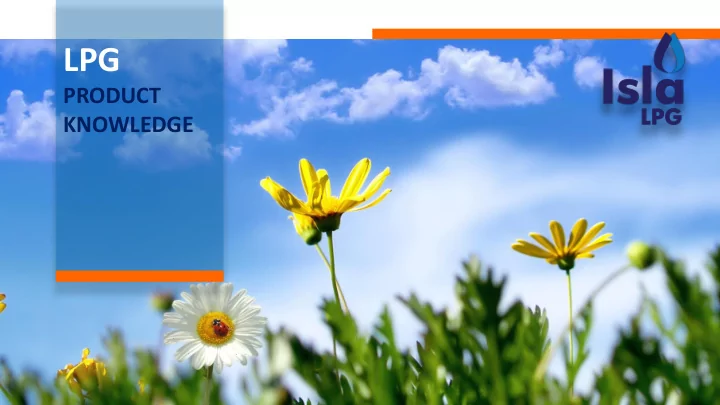

LPG PRODUCT KNOWLEDGE
LPG PRODUCT KNOWLEDGE
L P G IQUEFIED P ETROLEUM AS It is a fossil fuel byproduct that exists as gas under normal atmospheric conditions but is changed into liquid by an appropriate change in pressure.
AT HOME Cooking, heating, air- conditioning, water heating, refrigeration, incinerating
IN THE FARM Chicken brooders, incubators, crop drying, tobacco curing, greenhouse heating, rice threshers
INDUSTRIES Brazing, soldering, ceramic firing, clothes pressing, die casting, drop forging, annealing, hardening
TRANSPORT Auto LPG for vehicles such as cars, SUV’s, and forklifts
SUPPLY AND DISTRIBUTION
IMPORTANT MARKINGS BPS MARK TARE WEIGHT REQUALIFICATION DATE
LPG STORAGE 22kg Forklifts 11kg Homes Small Restos 50kg BULK/INDUSTRIAL Restaurants Hotels Farms Industries
PHYSICAL PROPERTIES
VAPOR PROPANE (C 3 H 8 ) 30-40% LIQUID BUTANE (C 4 H 10 ) 60-70%
PURE LPG IS COLORLESS AND ODORLESS LPG is as clear as water in liquid form and invisible in vapor form. Pure LPG has no smell. Ethyl mercaptan is added so any leaks can be detected by scent.
LPG VAPOR IS HEAVIER THAN AIR LPG vapor when released to the atmosphere is heavier than air. LPG vapor will then tend to deposit on the lowest portion in the area.
LPG VAPOR IS HEAVIER THAN AIR LPG vapor when released to the atmosphere is heavier than air. LPG vapor will then tend to deposit on the lowest portion in the area.
LPG VAPOR IS HEAVIER THAN AIR LPG vapor when released to the atmosphere is heavier than air. LPG vapor will then tend to deposit on the lowest portion in the area.
LPG LIQUID IS VERY LIGHT LPG liquid is light as it weighs only about half as much of the weight of water for the same volume.
LPG LIQUID IS VERY LIGHT LPG liquid is light as it weighs only about half as much of the weight of water for the same volume.
LPG dissolves natural rubber
LPG is non- poisonous and environment- friendly
LPG HAS HIGH HEAT CONTENT LPG has a calorific value of about 49,500 kilojoules per kilogram. For an 11-kg cylinder, that amounts to heat enough to boil 5 liters of water everyday for 346 days.
L Increase in heat comes with increase in pressure LPG in the liquid phase expands due to any increase in temperature. The liquid inside the tank tries to evaporate, but, since it is trapped inside the confines of the tank, pressure builds up.
L Increase in heat comes with increase in pressure LPG in the liquid phase expands due to any increase in temperature. The liquid inside the tank tries to evaporate, but, since it is trapped inside the confines of the tank, pressure builds up.
ULLAGE 15% L 85% Because of liquid expansion, filling is done only up to 85% capacity. The “free space” is called ULLAGE. Overfilling the tank may result to dangerous hydraulic pressures which may cause the discharge of liquid out of the pressure relief valve, or may even rupture the tank.
LIQUID TO VAPOR EXPANSION One unit of liquid is equivalent to 250 units of vapor. 250 TANKS VAPOR 1 TANK LIQUID
COMMERCIAL/ MULTI-CYLINDER Small industrial plant Malls Hotels Restaurants Laundry Shops
BULK/ INDUSTRIAL Manufacturing plants Large Hotels Malls
SAFETY
TRIANGLE OF FIRE Source Oxygen of Ignition Fuel / LPG
LIMITS OF FLAMMABILITY Air-Fuel Mixture TOO RICH TO BURN WILL BURN TOO LEAN TO BURN (11-100%) (2-10%) (0-2%)
Air-Gas Flammable Mixture The LFL (Lower Flammable Limit) is around 2% mixture of LPG in air - this means that 1 liter of liquid LPG, when mixed with air will give 12,500 liters of flammable mixture .
EMERGENCY ACTION PROCEDURES Eliminate all sources of ignition immediately. Do not switch on/off electrical switches which may cause sparks.
EMERGENCY ACTION PROCEDURES Close the main gas valve to stop the flow of gas.
EMERGENCY ACTION PROCEDURES Open windows, doors and other openings to increase ventilation.
EMERGENCY ACTION PROCEDURES Cover leaking portion with wet cloth and/ or spray water to disperse vapor cloud.
EMERGENCY ACTION PROCEDURES If leak is on the cylinder, bring the cylinder to a well ventilated and isolated area.
EMERGENCY ACTION PROCEDURES If the escaping vapor catches fire: Shut-off main gas valve as well other valves along the line. If fire is on cylinder, spray on the upper portion of the cylinder to keep it cool.
SAFETY TIP Use soapy water when checking for leaks.
SAFETY TIP Use LPG resistant flexible hose
SAFETY TIP Since LPG vapor is heavier than air, it is therefore unsafe to install LPG tanks on the lowest portion of any structure.
SAFETY TIP Do not store cylinder in kitchen cabinets without proper ventilation.
SAFETY TIP Keep cylinder upright. Never invert or let lie horizontally
SAFETY TIP Store cylinder away from electrical appliances and other sources of fire/ ignition 3.0 m 1.0 m 10 ft. 3 ft.
SAFETY TIP Don’t change cylinders in the presence of naked lights.
SAFETY TIP Don’t use tools to operate cylinder valves.
SAFETY TIP Don’t drop cylinders off vehicles as it may cause damage to cylinders & valves.
Think Safe. Think Solane.
Recommend
More recommend